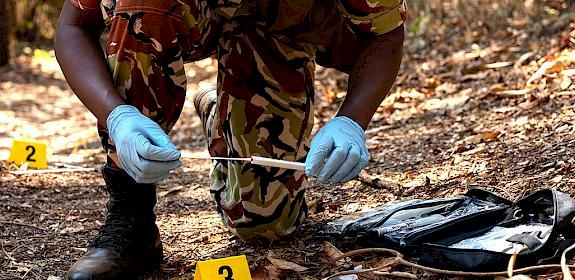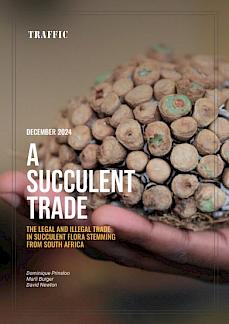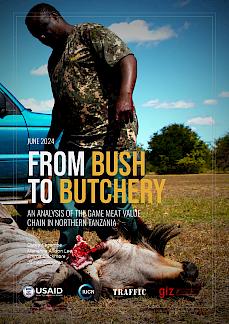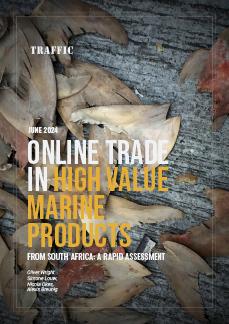
The view from Mount Cameroon. Cameroon is a priority country for strengthening legal timber trade © A. Walmsley / TRAFFIC
i
TRAFFIC in Africa
Africa is a treasure-trove of natural biodiversity, home to an abundant array of wildlife and supporting invaluable unique ecosystems.
Unfortunately, African countries continue to suffer critical rates of poaching and unsustainable trade which threaten not just a myriad of irreplaceable animal and plant species, but also has an effect on governance, local economies, national security, and wider social issues. We work across the continent to monitor trade levels and support governments in strengthening wildlife legislation and develop stronger enforcement capacity.
Africa focus:
trade monitoring, enforcement support, sustainable harvesting, regulatory change
an introduction to our priorities
We have offices in three African countries; co-ordinating wildlife trade action across Central, East and Southern Africa.
Combating poaching and over-exploitation of natural resources continues to be a high conservation priority on the continent. An average of three rhinos are illegally killed each day in South Africa alone, 1,000,000 pangolins have been poached in the last decade, 65% of South African Abalone is illegally harvested, and forests in Cameroon, Madagascar, and beyond are facing rampant levels of illegal logging and over-exploitation.
We run numerous projects in Africa, simultaneously assessing levels of wildlife trade, developing innovative approaches to tackling wildlife crime, and supporting transformative regulatory change that benefits wildlife and sustainable human development.
Priority countries for our work in Africa
i
contact us in Africa
East Africa (Tanzania)
+255 758 390 654
Central Africa (Cameroon)
+237 22 06 74 09
Southern Africa (South Africa)
+27 12 342 8304/5

Africa bears the brunt of wildlife crime and unsustainable trade. Strengthening enforcement capacity and legality frameworks is essential if we are to preserve the continent's spectacular biodiversity
Denis Mahonghol, Director - Central Africa
some areas of focus within wildlife trade in Africa
Explore the contextual background to some of our priorities in Africa and their links to our wider projects and conservation strategy.
There has been a strong positive international response to the poaching crisis affecting the African continent. Co-ordinated action between governments, and ongoing support from the public and conservation community has brought the issues of wildlife poaching and unsustainable trade to the international stage.
We are working to ensure that positive commitments translate into tangible action, including helping to develop new approaches to tackling wildlife crime and facilitating changes to national and international legislation.
a selection of our conservation projects in Africa
Reducing Trade Threats to Africa's Ecosystems
Reducing Trade Threats to Africa's wild species and ecosystems (ReTTA), works to identify trends in illegal or unsustainable trade and help develop national and international solutions to help turn the tide for wildlife.
ReTTA supports a wider suite of activities taken by TRAFFIC, providing insights into legal and illegal trade dynamics and identifying ways to increase the power of data collection in guiding global wildlife trade policy.
Common Hippoptamus Hippopotamus amphibius © Martin Harvey / WWF
i
Sustainable timber trade
Timber is the world’s most valuable wildlife commodity in trade, but unsustainable harvesting in Africa is devastating pristine ecosystems and depriving local communities of their livelihoods and much-needed revenue.
We're working in various African countries to develop National Legality frameworks and training manuals to help industry harvest timber legally and sustainably as well as helping enforcement agencies detect illegal logging.
Trucks carrying timber wait to offload at Douala port, Cameroon © A. Walmsley / TRAFFIC
i
Wildlife TRAPS
The Wildlife TRAPS Project, financed by USAID and implemented by TRAFFIC in collaboration with IUCN, is designed to develop and deliver a suite of ground-breaking partnerships and pioneering approaches to tackle wildlife crime between Africa and Asia.
Temminck’s Ground Pangolin Smutsia temminckii © Darren Pietersen / African Pangolin Working Group
i
Elephant Trade and Information System
The Elephant Trade Information System, commonly known as ETIS, is the CITES-mandated tool that tracks illegal trade in elephant ivory and other elephant products.
Managed and operated by TRAFFIC on behalf of the CITES Parties, ETIS has been designed to establish trends in illicit elephant product trade and changes in trends over time.
Seized Shipment of Illegal African Elephant Tusks © WWF / James Morgan
i
latest reports related to AFRICA
Africa is a major source of wildlife products, so many of our reports are concern wildlife trade from Africa. Explore the latest publications here.
For the full TRAFFIC archive, visit our publications page.











